Voice is a tricky thing. It’s one of those writing qualities where you know when you see it, but it can’t be easily described or defined. Yet you hear it talked about all the time, particularly from critics… “A fresh new voice.” “An original and unique voice.” But rarely does anyone ever qualify what voice is—because, in a way, you can’t. Not in the same way you can describe, say, the machinations of a plot, a system of magic, or an imagined sci-fi universe. Voice can’t be taught, and it can’t be replicated. And yet, it’s one of the most crucial aspects of fiction.
To me, voice is point of view. It’s the character of the person telling the story—maybe the writer, maybe the narrator, maybe a blending of the two. The point is, you get a sense that there’s a distinct vision, personality, or both behind the work. For example: Guillermo del Toro has a distinct voice; you know what his films are going to look and feel like. You recognize the consistency of the ideas driving his stories. Megan Abbott has a tremendous voice—if you’re familiar with her writing, you can be given one of her books, not know she wrote it, and likely guess it’s her work.
Voice, you can say, is where craft and an artist’s life collide. It’s the marriage of what they’ve learned as a writer, director, etc. and what they’ve experienced as a human being.
When I set out to write Barbaric—my comic series about a barbarian (Owen) cursed to always do the right thing, whose moral compass is a sentient axe (Axe) who gets drunk on blood—my top priority was to get my voice into the story. I wanted to get my way of looking at life—a gaze that’s cynical yet loving, humorous, and thoroughly over all the bullshit—into Owen’s story. Barbaric isn’t about me, but it’s told in a way only I can tell it. Which is one of the most vital aspects of voice—the reality is, most every story has been told. Rare is the storyteller that tells a story that hasn’t been recorded, in some form or variation, at some point in the past. That’s why it’s oftentimes not only the story itself that draws us in; it’s about how the story is told.
That’s where my mind was focused with Barbaric. Because, look, I know what this story is: It’s a sword and sorcery riff. It’s Conan the Barbarian with a twist. The trick was telling the Conan story in a new way; telling it in a way that I thought only I could tell it. Which is how I came to Owen: This guy who’s past his prime and can no longer do the cool shit he used to do. He’s weary, he’s sardonic, and he’s got this axe with him all the time, always telling him what to do and screaming at him to feed him blood (I have two kids, and the similarities between them and a bloodthirsty axe are remarkably similar).
Also, I wanted to tell a story that’s fun—fun to read and fun for me to tell. I’m the kind of guy who likes turning the dial up to 11; I unironically like Mötley Crüe; I think Michael Bay, in proper doses, can be all right. I’d had the idea for a cursed barbarian for a long time, but I could never get myself excited to tell Owen’s story in your typical fantasy genre way. I didn’t want to build a big, crazy world; I didn’t want to craft a complicated mythology. I just wanted to focus on Owen, cursed and miserable, and his shit-talking, bloodthirsty companion, and see what happened with them as they went around the land, forced to be the last thing either of them really wants to be—good.
And I had some inspiration along the way. When I think about unique fantasy stories that have wildly unique and compelling voices driving them, I think of these six authors…
Joe Abercrombie
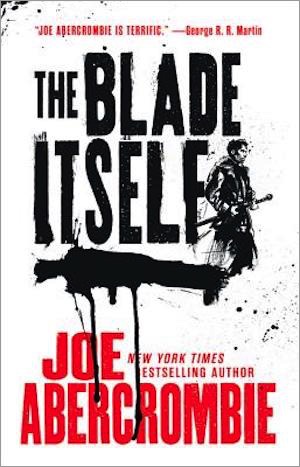
We all know Abercrombie as one of the godfathers of grimdark, and that reputation isn’t wrong. You can point to The Blade Itself and see how it became a kind of blueprint for many fantasy novels to come. But what I think often gets confused in discussions about Abercrombie’s work is that he’s not dark in the way you’d expect. His books aren’t considered grim just because, as they say, none of his characters are safe. The darkness in Abercrombie’s work stem from his moral and philosophical complexities. He’s constantly putting characters in positions where they have to choose one awful thing or another, or do something that’ll be beneficial to them but awful for everyone else.
He’s like Cormac McCarthy blended with Robert Jordan. Not only that, but Abercrombie—at least to me—is hilarious. In all the obsidian waters he forces his character to wade through, he regularly manages to find some kind of unexpected—and usually bleak—humor.
Nicholas Eames
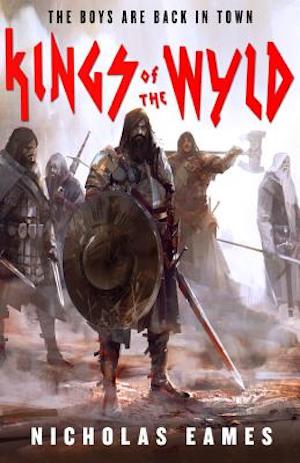
In one of the opening chapters of Eames’s sterling debut novel Kings of the Wyld, the story’s protagonist, Clay, has decided to help one of his old friends in what is likely to be a suicide mission into a deadly battle. We know Clay was once the leader of a band—a group of badasses traveling the realm, slaying monsters, quelling evil, and wowing townspeople with their heroic escapades—and the life he used to live wasn’t exactly a noble one. But that was a long time ago. Clay’s different now. He’s got a family and a lousy post in a small village.
The magic trick that Eames pulls, though, is how he balances so much in a short space—enough to distinguish himself as tremendous new voice in fantasy. Sure, Clay’s life was violent, and there’s a lot of humor in his reunion with his former bandmate. But there’s also sorrow there. Regret, too. And I dare anyone to just try to keep their eyes dry when Clay has to say goodbye to a certain someone that’s dear to him. Eames’ writing doesn’t put a premium on worldbuilding or mythology—it’s all character and voice, and it’s a masterpiece because of it.
Robin Hobb
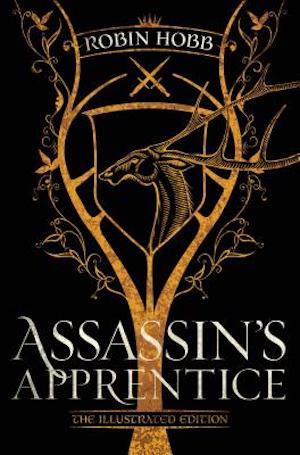
It’s impossible not to talk about fantasy voices without mentioning Hobb’s work. It’s funny, because her voice has almost become the standard, as it has been mimicked so often over the years. It makes you almost forget just how powerful and unique her work has always been, from The Farseer Trilogy all the way to her most recent work. Her combination of worldbuilding, wit, and absolutely gorgeous prose has influenced an entire generation of writers, and beyond. And few fantasy writers bring as much nuance to the genre as Hobb—in her world, just because a character has claimed victory, that doesn’t mean they’ve won.
Christopher Buehlman
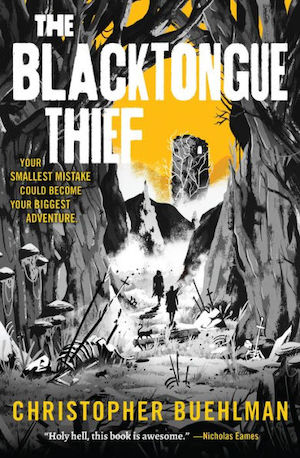
As with Eames, everything you need to know about Buehlman’s stunning fantasy novel The Blacktongue Thief is in its opening salvo. You’re introduced to Kinch, the blacktongue thief himself, who relates his tale with colorful narration and a whole lot of style. In just a few short pages, Buehlman sets the stage for a story that’s told in a way that’s richly its own and features an unforgettable cast of characters.
Not to mention moments that had me laughing out loud—a rarity for me—while reading. Like in the first chapter when, after Kinch’s band of thieves try and fail to rob someone more powerful than them and one of them gets her hand cut off, Buehlman writes: “Spear had picked up her lost hand and run into the forest like she knew a sewer-on of hands whose shop closed soon.” That is simply priceless.
Marlon James
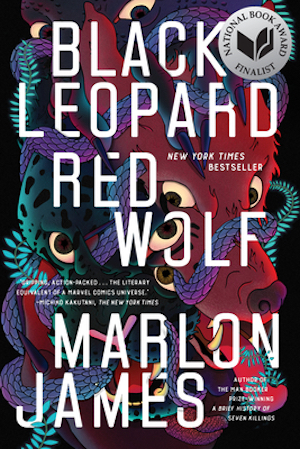
You know, I’ve mentioned before how I don’t put all that much stock into worldbuilding, and that’s true. And while some authors manage to excel at one or the other, voice or world, not many can do both. James, though, is the exception. His first novel in the Dark Star Trilogy, Black Leopard, Red Wolf, presents a rich and intricate fantasy world, steeped in history and myth. It’s truly stunning. And his voice, so clear, complex, and oftentimes brutal, practically leaps off the page. James’s book is epic, and feels like every choice he makes—in the story and in how it’s told—was considered down to the most granular level. This book is raw, powerful, and though it’s often been compared to Game of Thrones, I, personally, don’t think that’s apt. James’s story, and his voice, are all his own—I completely fell into this novel. Or, better yet, James pulled me in.
Jonathan French
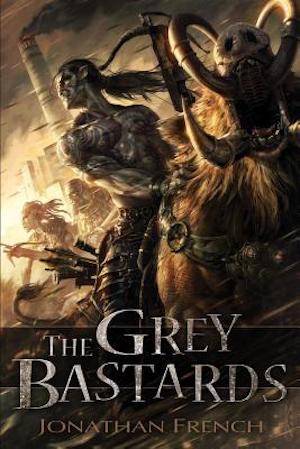
Speaking of books that announce themselves, thoroughly, within mere pages: French’s The Grey Bastards grabs you by the lapels right from the start and never lets go. I think there’s a blurb on the cover that likens this book to the show Sons of Anarchy, and that’s absolutely accurate. French’s story packs in plenty of darkly humorous moments, but he’s also unafraid to up the mayhem, much like SoA, resulting in some truly grueling moments and dark twists.
French turns the fantasy genre inside-out by dropping the tropes we all know into something like prestige TV; he’s constantly twisting the screws on his characters, upping the ante, all while crafting an unforgettable band of gritty characters. Also, a group or orcs who ride literal hogs like motorcycles is just too good of a concept to not fall in love with. This book is bloody, it’s fun, and French writes in a way that’s all his own.
Buy the Book
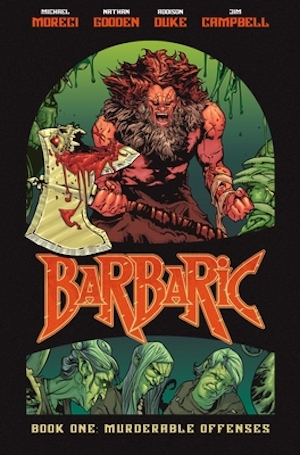

Barbaric Vol 1: Murderable Offenses
Michael Moreci is a screenwriter and bestselling comics author. His debut feature film, Revealer (which he wrote and executive produced), will premiere later this year. In the comics space, Michael is the co-creator of the existential space opera Wasted Space, the gothic horror series The Plot, the werewolf drama Curse, and the sword-and-sorcery series Barbaric, which Entertainment Weekly, Thrillist, and many others called one of the best comics of 2021. He’s also written for numerous legendary characters and properties, including Star Wars, Stranger Things, and Batman. Michael currently lives outside Chicago with his wife and kids.










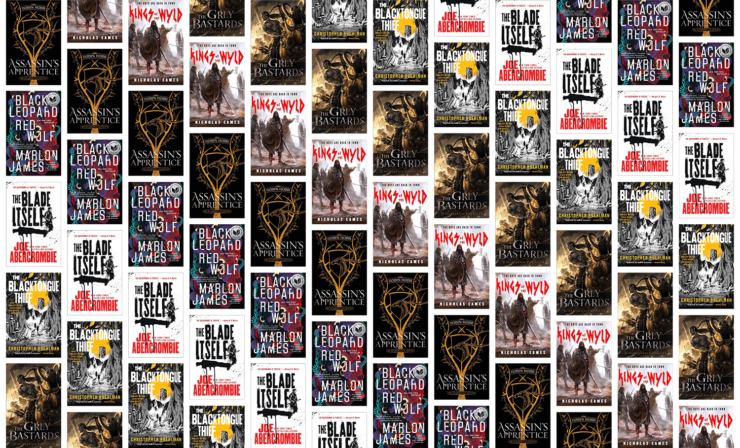
Murderbot.
Great list. I love a strong voice in a novel. Have to point out that Black Leopard, Red Wolf was Marlon James’ fourth novel, although I believe his first explicitly genre one.
https://en.wikipedia.org/wiki/Marlon_James_(novelist)
@2: Thanks–updated!
Great list idea!
I thought of Naomi Novik. I keep forgetting that her books aren’t boldly illustrated, because the visual and other sensory descriptions are so vivid.
Have to put in a plug for Catherynne Valente – her books are so wide-ranging in terms of topics, and the narrative voices are so distinct, but you always know it’s a Valente story.
Unfortunately, it looks like my favorite author, Robin Hobb, is semi-retired at this point. At least, according to her last blog post on her website, that is. She thinks she might have one more book in her but she’s not sure.
Seanan McGuire. She’s the only author who I allow to emotionally destroy me repeatedly (mostly with envy), in a pattern wherein I dread a book, read the book, loudly complain about the book, and then brace for the next book because they’re too good not to read. Authorial voice is a major reason for that, especially in the Wayward Children series where it’s particularly prominent, poignant, and beautiful.
Wow. Only one woman on the list? How about Nnedi Okorafor? NK Jemisin? Martha Wells? Becky Chambers? Connie Willis? And so much dark and violent in the list. Fine in moderation, but vary it up a bit
Great list! If I had to add one it would definitely be Steven Brust. Every one of his novels ends up on my “keeper” bookshelf.
I tried Joe Abercrombie. I quit after about 20 pages. I can’t remember the title. His writing is clumsy. My prose ideal is probably Dashiell Hammett or maybe Peter Carey. They could write simple declarative sentences that draw you in. Not so much for Abercrombie.
I’m waiting with bated breath for the next in the Locke Lamora series by Scott Lynch; sadly, it seems that Mr. Lynch ran into some difficulties and the next book is on indefinite hiatus.
Diane Duane promised faithfully that she is working on the conclusion to her Door Into… series, but again, real life has been intervening. This seems to be a common theme during COVID :(
How can Terry Pratchett not be on this list? :D And Patricia McKillip, for equally stylistic but very different reasons.
Although your list skews to more modern voices, I think the list should include a few of the masters such as Janny Wurts, Poul Anderson, Raymond Feist, Steven Erickson and Glen Cook
Tamsyn Muir destroyed me with her debut, Gideon the Ninth. Most original voice I’ve read in a long time.
@12: Yes, Sir Terry is absolutely distinctive and unique. He was my first thought when I saw the title of this post.
I think some people responding are just listing good writers who wrote good books, not writers with a distinctive voice, which is not necessarily the same thing. Some really good books just take the way things are done, and do it really really well. (For that matter, some writers have a distinctive voice but their books are still lousy, but let’s not worry about them)
@12 Absolutely agreed.
@13 Janny Wurts does not have a distinctive voice–even when she’s good, it’s pretty standard writing style. And I don’t think even her best is all that amazing, just fairly solid, while the lower end is stupid soap opera. Not a master. Feist wrote some good books which I really quite liked, but again, it’s pretty standard style, not a very distinctive voice. Steven Erikson and Glen Cook, I won’t argue.
I’d like to mention Tim Powers; nobody else writes very much like Tim Powers and his books can be very powerful. Newer writers that come to mind for me include Aliette de Bodard, whose trilogy about an Aztec priest plunges you so deep into an Aztec head space that you start feeling the fear the sun won’t make it across the sky if you don’t sacrifice some warriors to help fight the forces trying to stop it. And Silvia Moreno’s Gods of Jade and Shadow, which is a lovely book, but also one where I constantly felt like reading little bits of description aloud to friends because they were so witty.
Many of my current favourites, though, wouldn’t fit on this list. Marshall Ryan Maresca, for instance, has good characterization, great worldbuilding, solid and fast moving plot, lots of tension, hands his characters serious internal problems but doesn’t wallow in them like many current fantasy writers do–generally does tons of good stuff. A distinctive voice is not his thing, though; his prose gets the job done solidly without calling too much attention to itself, like many another good writer.
eluki bes shahar has a *very* individual voice, as does Suzette Haden Elgin. eluki is lyrical in her own way, while Elgin can do purest Appalachian. I agree with Scott Lynch as well for individual voice.
But saying Terry Pratchett doesn’t have a voice? Really?
I would definitely add Terry Pratchett to the list.
To avoid any confusion here, no one said Terry Pratchett didn’t have a voice–as always, the list above clearly isn’t intended to be exhaustive; otherwise we would have called it “The Only Six Compelling Voices in Fantasy” :) We appreciate all the other recommendations in the comments!
Fun fact – Christopher Buehlman honed his wordsmithery for years while performing at Renaissance Faires as Christophe the Insulter, Professionally insulting people for money. My friends chipped in and got me insulted for my birthday, and while I do not remember most of it over the roaring in my ears, I remember that it lasted several minutes, large parts of it rhymed, and it involved props. It never would have occurred to me to rhyme “Sodom and Gomorrah” with “labia minora”…
Cassandra Khaw’s books – i think the first one i read was Rupert Wong, Cannibal Chef – there is a distinctive cadence to their prose that brings me joy in the midst of whatever nasty event is happening. I am not a horror fan, but was happily reading my way through Khaw’s books before the pandemic shut down my brain and i became a sad non-reader. i can only hope that the brain-fog lifts soon. My pile of tbr books is getting dangerously unstable.
French: half-orcs not orcs. they are in a different social space, all abandoned babies whose mothers were rape victims. The way readers may “see” them as orcs, I guess because “half orcs” started genre life as bad guys, is interesting and twisty in itself. On voice absolutely agreed.
I know people are annoyed that his trilogy isn’t complete but Patrcik Rothfuss really deserves a mention. His writing is pure artistry.
When it comes to voices, few are as distinctive as R. A. Lafferty. It’s often hard to tell if he is writing Science Fiction or Fantasy. But Lafferty always sounds like Lafferty.